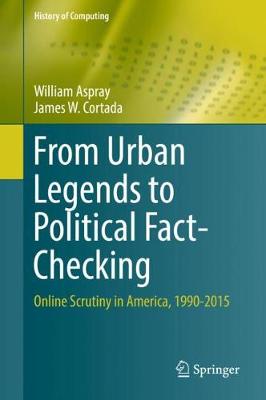This text presents an historical examination of political fact-checking, highlighting how this is part of a larger phenomenon of online scrutiny that manifests itself in multiple forms. Reflecting the long history of “fake facts” in America, the book discusses important developments in this area from the emergence of the public Internet in the 1990s to the start of the Trump-Clinton presidential election campaigns.
Topics and features: describes how some of the major players in political fact-checking began with the purpose of scrutinizing and debunking of urban legends; considers how this was part of a wider culture, encompassing B-grade horror movies, truth-or-fiction television shows, and groups warning about computer viruses; explains how such developments are connected, revealing political fact-checking as one of many forms of scrutiny applied in the face of a complex, dangerous world; provides a range of detailed case studies, covering such topics as the rumors surrounding the 9/11 terrorist attacks, and academic interest in contemporary legends; discusses how pre-Internet technologies such as bulletin boards, Usenet, and proprietary online service providers such as CompuServe and AOL were used to both disseminate and debunk urban legends; examines the rise of political fact-checking, reviewing all of the major initiatives in this area undertaken in the United States.
This timely study touches on issues of popular culture and major events, and offers profiles of colorful individuals and organizations, and as such will appeal to a broad audience interested in the history of fact-checking and efforts to protect the political process from falsehoods.
- ISBN13 9783030229511
- Publish Date 30 August 2019
- Publish Status Active
- Publish Country CH
- Imprint Springer Nature Switzerland AG
- Edition 1st ed. 2019
- Format Hardcover
- Pages 146
- Language English
